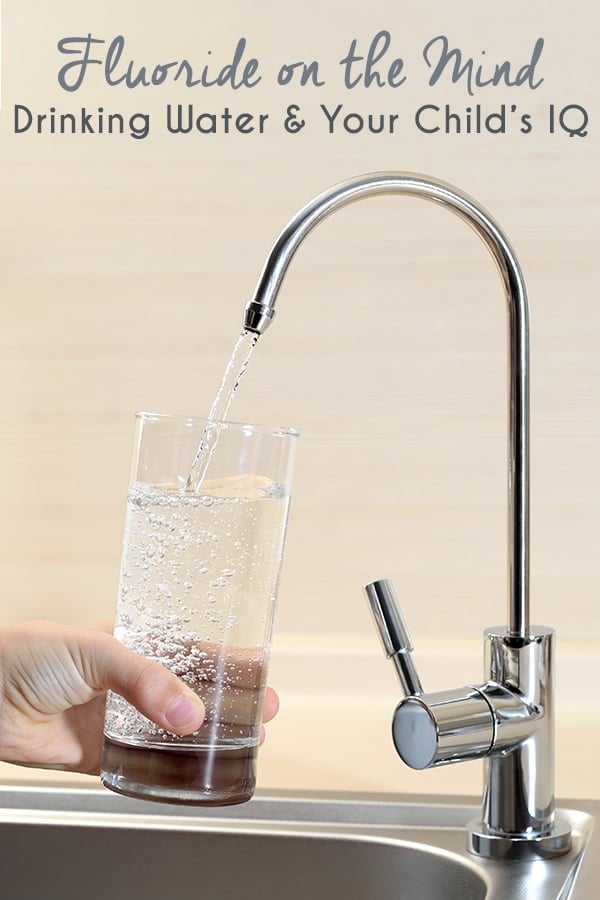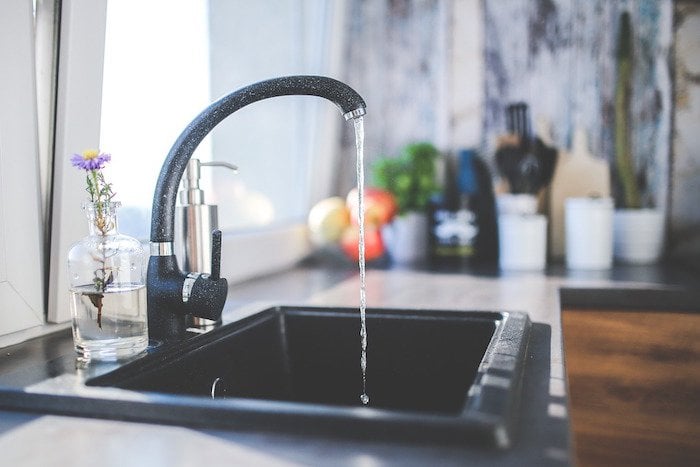Fluoride on the Mind: Drinking Water and Your Child’s IQ
Could fluoride in drinking water be dumbing our kids down?
If so, what can we do about it?
In April of 2015, the U.S. Department of Health and Human Services lowered its recommended level of fluoride in drinking water for the first time since issuing its recommendation for fluoridation in 1962.
Why?
The rate of dental fluorosis in American teenagers is on the rise.
Between 1986 and 2004, the number of teens aged 12-15 showing signs of fluorosis rose from 22.6% to 40.7%, while in the general population the number of moderate to severe fluorosis cases nearly tripled.
Dental fluorosis refers to tooth discoloration, including white flecks and streaks. It is caused by overconsumption of fluoride as teeth are developing under the gums. By itself, it is typically harmless – although in severe cases it can lead to pitting of the enamel. But it does indicate an elevated level of fluoride in the body.
Conflicting Evidence for the Safety of Fluoride
The CDC’s website states, “Experts have weighed the findings and quality of available evidence and concluded that there is no association between water fluoridation and any unwanted health effects other than dental fluorosis.”
However, a recent meta-analysis by Harvard School of Public Health (HSPH) researchers questions the truth of this statement. The review of 27 studies found that “children in high-fluoride areas had significantly lower IQ scores than those who lived in low-fluoride areas.”
Among the 8,000 children analyzed within the first study, the average loss in IQ was equivalent to 7 IQ points. Philippe Grandjean of the HSPH says “fluoride seems to fit in with lead, mercury, and other poisons that cause chemical brain drain. The effect of each toxicant may seem small, but the combined damage on a population scale can be serious.”
Berkey Water Filters Remove Fluoride, Chromium-6, Lead, and More Harmful Chemicals
Some of the studies analyzed in the Harvard review were done in China and some of the populations were drinking water containing fluoride levels well above allowable levels in the U.S. However, a 2014 HSPH pilot study suggests that our high levels of dental fluorosis may provide reason to believe that American children, too, are at risk.
The study points to a significant relationship between dental fluorosis and lowered cognitive functions. According to researchers, “Dental fluorosis score was the exposure indicator that had the strongest association with the outcome deficits.”
Practical Measures for Concerned Parents
Sometimes it takes a while for national policy to catch up with cutting edge research. In the meantime, it’s up to parents to decide for themselves what actions they should take, if any, to ensure that their kids’ fluoride levels remain at a safe level.
How can you determine how much fluoride your child is getting?
 To start, it’s a good idea to find out how much fluoride is in your drinking water. Most U.S. residents can find out easily through the CDC’s My Water’s Flouride app. If your community’s water supply is not listed, or if you have a home well, the EPA suggests having your water tested every three years. Ask your local public health department or extension agency to recommend a lab.
To start, it’s a good idea to find out how much fluoride is in your drinking water. Most U.S. residents can find out easily through the CDC’s My Water’s Flouride app. If your community’s water supply is not listed, or if you have a home well, the EPA suggests having your water tested every three years. Ask your local public health department or extension agency to recommend a lab.
While drinking water is the primary fluoride source for most individuals, the chemical is present in many foods and other common sources. Unfortunately, it’s next to impossible to know for sure how much fluoride your child is being exposed to. For this reason, many parents are taking steps to limit that amount.
Should you avoid fluoride altogether?
The American Dental Association has long been a staunch advocate of fluoride for its decay-preventing qualities. However, you can find plenty of dentists who don’t recommend that kids drink water with added fluoride, stating that fluoride treatments at the dentist’s office are enough. Other sources, including the Fluoride Action Network and Dr. Mark Burhenne believe it is unnecessary for overall human health and the prevention of tooth decay.
What is clear is that most children are getting too much fluoride, and it is up to parents to reduce their exposure to a reasonable level – whatever they believe that to be.
Water filtration (here’s some really helpful info on water filtration) with the addition of a fluoride filter is probably the easiest way to do this. However you can also choose to use non-fluoridated toothpaste, skip the fluoride treatments at the dentist, and/or avoid foods high in fluoride while your child’s teeth and brain are developing.
Keep in mind, too, that tooth decay is a serious health issue. Whatever course of action you decide to take, be sure to teach your kids good oral hygiene, feed them responsibly, and watch their teeth and gums carefully for signs of both fluorosis and dental disease.
Taking these steps will help ensure that both their mouths and their minds remain in optimal health!
Non-Drinking Water Sources of Fluoride
- Dental products, including toothpaste and fluoride treatments
- Processed foods and drinks, including some infant foods
- Pesticide residues on fruits and vegetables, especially in non-organic grape products
- Black tea
- Seafood
- Mechanically separated meat, especially chicken
- Fluorinated pharmaceuticals
- Food cooked in Teflon pans
- Infant formula prepared with fluoridated water
Source: Fluoride Action Network
Is Your Water Filter Doing the Job?
Filtering your water is one of the simplest things you can do to reduce your family’s fluoride consumption. And home filtration is much more environmentally friendly than purchasing bottled water. But beware – not every water filter will do the trick.
Here are five solutions that work:
Water distillers – A home water distillation unit will remove virtually all the fluoride from your drinking water. However it will remove all the other minerals, too, which some people think leaves the water tasting flat. You can add trace mineral drops or mineral-rich sea salt to replace these lost minerals.
Reverse osmosis filters – These work by passing water through a semi-permeable membrane. They are typically available as whole-house or under-sink filters, although there are some countertop models available. Rates of fluoride reduction vary; the ones with slower flow rates usually do a better job. The downside is that most reverse osmosis filtering systems waste two to three times as much water as they produce.
Activated alumina filters – This type of filter works by absorbing unwanted chemicals. Disposal or re-use of spent filters must be undertaken carefully to avoid environmental contamination.
Deionizing filters –These filters pass the water through a resin matrix to remove impurities. They should remove about 90% of the fluoride from your water.
Bone char carbon filters – These use charcoal made from animal bones to yield high quality filtered water with up to 90% of the fluoride removed. However, they may be unsuitable for vegan or orthodox families.
Berkey purification process – More than six different media types, all constructed into a compact matrix containing millions of microscopic pores, Berkey’s filter uses adsorption, absorption, an ion exchange to purify water. Because of their gravity flow nature, water molecules can take several minutes to pass through the filter elements. This longer contact time between the water molecules and the filter media provides much greater removal rates of harmful water contaminants. We recommend the Big Berkey with the fluoride filter. You can also find Berkey products at Amazon.
Do water filtration pitchers remove fluoride?
Most of the pitchers you find in stores will not remove the fluoride from your water. Here are a few brands that have been proven to remove fluoride:
ProPur Water – available in regular and fruit-infusing versions
Aquasana powered water pitcher & filtered water bottles
Zerowater filtering pitchers & filtered portable tumbler

